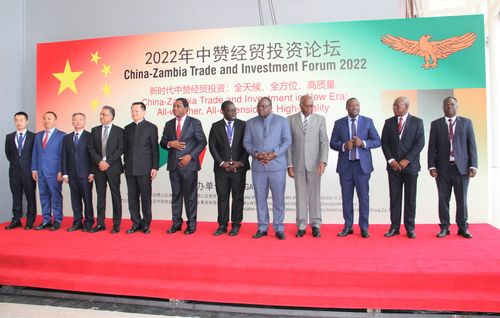By Dr. Bazil Hamusokwe
The historical ties between Zambia and China have undergone significant deepening in recent years, encompassing various forms of collaboration, including diplomacy and trade. Both nations have elevated their partnership to new heights, with China playing a vital role in Zambia’s nation-building endeavours since its early days of independence.
Notably, infrastructure development has been a key focus, epitomised by the financing and construction of the $455 million, 1,860-kilometre-long Tanzania-Zambia Railway (TAZARA) between 1970 and 1975. The Zambia-China relations have continued with the construction of roads, bridges, stadia and energy facilities, fostering connectivity and boosting trade in the region.
However, no fruitful partnership is without its challenges. It is essential to acknowledge that Zambia is not alone in experiencing the increasing Chinese influence in Africa. Kenya, Ethiopia, and Zimbabwe are among the notable countries with significant Chinese influence. Zambia, however, finds itself at a crucial juncture as China’s footprint expands. The question arises: How can Zambia achieve economic growth while safeguarding its sovereign identity?
Kwame Nkrumah, one of the prominent fathers of African liberation once said:
“Unite we must. Without necessarily sacrificing our sovereignties, we can forge a political union based on defence, foreign affairs and diplomacy, and a common citizenship, an African currency, a monetary zone and a central bank. We must unite in order to achieve the full liberation of our continent.”
Reflecting on Nkrumah’s appeal, to what extent have African countries advanced towards achieving this dream? Specifically, is Chinese presence increasing or reducing the chances of Zambia achieving Nkrumah’s dream? Analysing this delicate balance warrants a closer examination of some of the recent events.
Take for instance, in 2018, when former president Edgar Chagwa Lungu visited China’s Xi Jinping in Beijing to discuss the debt situation amid the Forum on China-Africa Corporation (FOCAC) Summit, one of prominent headlines was: Why is the Zambian government selling our country to China? This fear was also tensely expressed by Kenyan columnist Jaindi Kisero of the Daily Nation earlier in 2018:
“The Chinese will readily offer you infrastructure loans but you will only start feeling the pinch when the time for servicing the debt comes calling — and you realize that your economy is not raising enough dollars to repay it.”
Zambia must now pay back more than $6 billion to China. And true to Kisero’s word, the country has no funds to finance this debt, giving China all the leverage.
Dambisa Moyo, a renowned economist, aptly observes, “while such partnerships provide much-needed funds, it is crucial for Zambia to ensure that economic growth is not at the expense of long-term sovereignty.” This sentiment resonates with many, stirring discussions about the complex nature and potential consequences of China’s strengthening presence in Zambia.
Recently, in September 2023, when President Hakainde Hichilema visited China, it was déjà vu. The visit resulted in the signing of 15 memoranda of understanding (MoUs), including the formation of a cooperation plan on the Belt and Road Initiative, blueberry exports, media, and commitments totaling $1.4 billion which signified an important milestone.
Similar to Edgar Lungu’s visit in 2018, undisclosed details regarding agreement terms raise citizen concerns. Back in 2018, Trevor Simumba, an economist and trade expert, lamented the severe lack of transparency on critical aspects such as repayment terms, contracting obligations, project feasibility, value for money, and loan security. Consequently, this lack of transparency makes it impossible to have a clear understanding of the implications of these loans for public finances.
While the undeniable positive impact China has had on the developing nation is worth acknowledging, Simumba’s and Moyo’s words loom large; Zambia must approach these collaborations in a manner that safeguards its economic independence and democracy.
It is no secret that every international aid and foreign presence comes with its own set of interests, whether they be minimal or substantial. It would be short-sighted of the country to engage in foreign relations without understanding the interests of the other party involved. Therefore, it is imperative that Zambia treads cautiously, setting expectations and being mindful of the interests at play in any given collaboration.
This becomes especially important when assessing the type of aid the country has been receiving. For example, in the early 2000s, the nature of the China-Zambia economic relationship evolved into what was often termed a ‘win-win’ situation, but involving preferential grants linked to Chinese commercial interests, nonetheless. It is crucial to note that since the early ’90s, China’s official development assistance (ODA) to Zambia has predominantly taken the form of loans, with grants being minimal, as indicated by the African Forum and Network on Debt and Development (AFRODAD).
While acknowledging that China-funded projects can bring much-needed change, such partnerships must be carefully evaluated to ensure Zambia’s decision-making autonomy. The tied aid conditions, including the requirement for Chinese firms to work on Chinese-funded projects, underscore the complexity of such partnerships. These conditions raise concerns about the potential for dependency on China and the limited opportunities for local businesses to participate in these projects.
TopStar’s introduction as a digital TV migration solution, while necessary, is a notable example of compromised sovereignty. Established to control the country’s digital terrestrial network (DTT), TopStar, a joint venture between the state-owned Zambia National Broadcasting Corporation (ZNBC) and Chinese media company StarTimes, became the official public signal distributor in 2017.
However, TopStar’s ownership and control of Zambia’s broadcasting infrastructure sparks debate. With StarTimes holding 60% and ZNBC only 40%, questions arise about the potential for external influence over media messaging. Considering the critical role of media in shaping public opinion and promoting democratic discourse, the management of broadcasting infrastructure becomes a matter of national significance.
Additionally, TopStar, despite being a signal distributor, also provides content under the same license. This goes against the current broadcasting licensing framework under the Ministry of Information and Media (formerly Information and Broadcasting Services) which states, “no single entity shall hold both types of licenses at the same time.”
The lack of transparency around the TopStar agreements, combined with concerns about China’s influence, raise questions about the integrity of Zambia’s democratic institution. The previous government’s refusal to compromise on their 40% ownership stake in Top Star only adds to the speculation. It should be noted that media freedom is essential for a healthy democracy and should not be compromised through backroom deals. While pursuing collaborations like TopStar, Zambia faces the challenge of safeguarding its ability to shape its own narrative, and the diversity of voices within its borders.
China has a role to play in supporting Zambia’s development, but this collaboration should be based on mutual respect and a shared commitment to democratic values. Engaging in open dialogue will contribute to building a relationship that benefits both nations while safeguarding the autonomy of Zambia.
Multiple challenges and crises, in today’s world, are intertwined as mankind faces many global challenges. China and Zambia, in the face of these new circumstances, should stand side by side and work together to practice the principles of sincerity, real results, amity and good faith and pursuing greater good and shared interests to build a closer China-Zambia community of a shared future and promote sound and sustainable relations.
Dr. Hamusokwe is a Research Fellow at the Public Policy Research Institute of Zimbabwe

Discover more from MAKANDAY
Subscribe to get the latest posts sent to your email.



